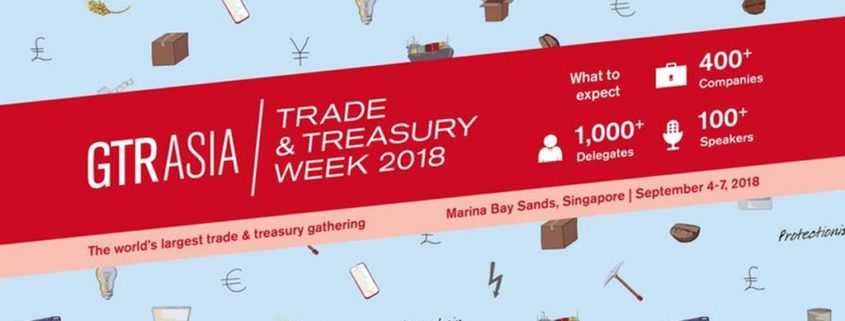Ross Wilkinson, Head of Global Accounts
Changing world trade by making processes faster and more efficient was a constant theme at GTR Asia Trade & Treasury Week in Singapore.
Held at Marina Bay Sands, from September 4 to September 7, and billed as the “The world’s largest trade and treasury gathering”, this very well-attended and organised event was impressive in the array of opinion-leaders and top business people it attracted.
On the second day I took part in a popular panel debate relating to alternative funding providers. This addressed where they fit into providing trade finance and how technology is part of the picture. We know that the weight of global banking regulation has encouraged many banks to limit their overseas commitments and concentrate on their home markets, where they can more easily assess who they are dealing with to achieve compliance. This has left a gap where smaller and medium-sized businesses find it increasingly difficult to gain access to trade finance.
We shared the platform with big name banks and with NR Capital, the Singapore-based alternative commodity trade finance solution provider which is using Bolero’s multi-bank trade finance solution to facilitate crucial investment support to companies in the bulk physical commodity markets around the world.
In a presentation, colleagues from NR Capital explained how they use Bolero to provide SME firms around the world with access to essential transaction support, investing in asset-backed transactions. Bolero is providing the automation, particularly for electronic bills of lading, and presentation of trade documents or for receipt of letters of credit from banks. The point made by NR Capital was that businesses should automate from day one in order to be handle growth in the most efficient way possible.
I was able to stress how our cloud-based Bolero platform is crucial to all this, enabling businesses that want to engage in trade to gain better access to trade finance at a time when big name banks are becoming more reluctant. Bolero’s auditable processes and automated, error-free checking, provide lenders with strong evidence that a business is compliant with Know Your Customer and anti-money laundering rules (AML).
The quality of the discussion and the number of people attending indicated a how digitisation of trade processes is already high on the agenda for many organisations. There was particular focus on the benefits of using electronic bills of lading (eBLs). Everyone understands the huge benefits of digitising trade documentation and dropping the centuries-old use of paper, but many are hanging back, waiting for greater certainty about the outcomes of different solutions.
Yet it was clear that many participants in the debate were in no doubt about the big advantages of digitising an important document such as the bill of lading. The problem may still be that many businesses involved in international trade remain unaware of how using eBLs could transform the efficiency of their entire operation. With that in mind, the panel debate was very useful in getting across the message about the benefits of digitisation to a very focused user-group.
Aside from these important aspects of international trade, the event was a useful barometer of opinion on some of the macro-economic challenges confronting everyone involved in trade, such as protectionism and how it will affect South East Asia and global trade with China.
Throughout the entire event, audiences for the various discussions and debates were consistently large, which is a sure sign of a well-organised conference and of the escalating interest among banks, corporates and carriers in using technology to make international trade more efficient and profitable.
More broadly, as the debate on digitisation is getting louder and has more voices clamouring for attention, Bolero is being well-heard.




